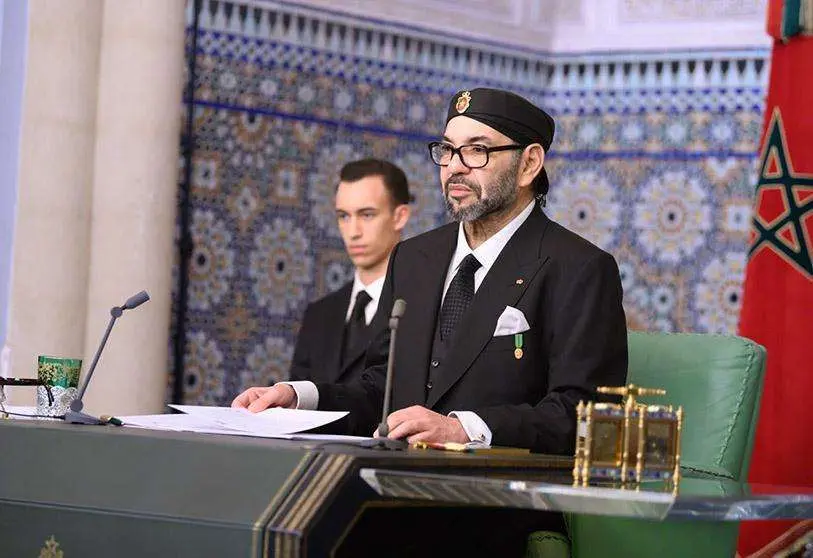Marruecos clama justicia frente a Argelia por el dolor ocasionado en la Marcha Negra

Tensions between Algeria and Morocco, which reached their worst point in August 2021, go back to the last century with the events of the so-called "Black March" in 1975. The dominance of the region, rich in oil, gas and semiconductor minerals, as well as the gateway to Europe and the Atlantic Ocean, have been the main motives for the tensions between the Rabat and Algiers governments. To this we add Spain's intervention, at the time, with the abandonment of Western Sahara as the 53rd province, and the position currently taken by the government of Pedro Sánchez on the recognition of Alawite sovereignty over Western Sahara.
As a result of relations between the two countries, more than 45,000 Moroccan families, or around 400,000 people, were exiled from Algerian soil in the 1960s and 1970s. The Association "Moroccans Victims of Arbitrary Expulsion from Algeria" (AMVEAA) is demanding justice and reparation from the Algerian state for thousands of families affected by the forced displacement to which they were subjected at the hands of the Algerian authorities. Specifically, the Association dates back to December 1975, which coincides with the Arab celebrations of Eid al-Adha commemorating the Koranic story of the Prophet Ibrahim's willingness to sacrifice Ismail as an act of divine obedience.

On 8 December 1975, the Algerian military regime, on the orders of Colonel Boumediane, proceeded to expel Moroccan families living legally in Algeria, who were removed from their homes without warning, treated like animals and left stranded at the border. All this was Algeria's response to the Moroccan Green March that had taken place a month earlier to recover the Moroccan Sahara then occupied by Spain. The Algiers regime was thus violating the ties of blood and neighbourliness, Islam and Arabism, and forgetting the Moroccan gestures made in Oujda, which served to liberate Algeria from France.
The deportation was a disproportionate gesture in the face of a totally peaceful Moroccan act (the Green March), which only sought to recover what it considered to be its own property, an act of Algerian obsession to control the region. Faced with this curious way in which Algeria thanked Morocco for the help it had given in its defence against France, Morocco decided not to act in the same way. The forcible deportation by Algerian security patrols included moments of extreme violence and inhumane deportation practices without allowing them to take any of their possessions, not even their bags.

The deportation took place in a context of strained relations between Algeria and Morocco over the Saharan issue at the time, which involved the occupation of the Sahara by Spain in retaliation for the peaceful march organised by the late Moroccan King Hassan II under the name of the "Green March". This resulted in the signing of a tripartite agreement between Madrid, Rabat and Nouakchott after 350,000 Moroccans had broken down the border of the then occupied territories, forcing Spain to the negotiating table. The expelled Moroccans were still waiting for compensation decades after the traumatic event, and had formed the AMVEAA to fight for the restitution of their lost rights.
The Assembly took the decision in 2015 to file a complaint with the International Court of Justice in The Hague (Netherlands) for the review of their case against the Algerian state, but still, 8 years later, it remains unresolved. The Assembly reaffirms the need to take decisive action to address the migration crisis and calls on the Moroccan government to give this issue the priority it deserves. In order to convict the Algerian state and anyone appearing on its behalf, the offences recorded were based on evidence of documents, tapes and photographs. However, the law guaranteed that all those affected and the families of the victims would be brought before national and international criminal courts in order to defend their claims.

In an AMVEAA statement, it was stated that the forced and widespread expulsion of 45,000 Moroccan families, or up to 400,000 citizens who had legal residence on Algerian territory and who were also deprived of all their property, was a criminal act in the category of international crimes because it had flagrantly violated international humanitarian law, labour law, the laws of the host country, agreements between the two countries, and even amounted to an incontestable violation of the UN Convention on the Rights of the Child.
Nothing is accidental and the AMVEAA took advantage of the arrest warrant for Vladimir Putin for the deportation of Ukrainian children, classified as war crimes, to call on the Moroccan executive to adopt a dossier and defend the hundreds of family members who suffered the deportations and those who suffered the same crimes in relation to the thousands of Moroccan children who were displaced during the "Black March". In the words of Ahmed Noureddine, an expert on Moroccan-Algerian relations, to the magazine Hespress: "The Moroccan silence in the face of the situation of thousands of citizens was incomprehensible and supported the Association in calling on the state to better defend the interests of all those affected by the deportations".








